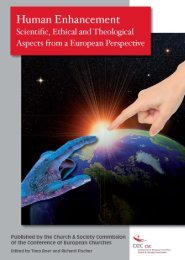Christians and Muslims: Praying together - Churches in Dialogue ...
Christians and Muslims: Praying together - Churches in Dialogue ...
Christians and Muslims: Praying together - Churches in Dialogue ...
You also want an ePaper? Increase the reach of your titles
YUMPU automatically turns print PDFs into web optimized ePapers that Google loves.
national disaster or <strong>in</strong> the midst of an <strong>in</strong>ternational conflict, <strong>Christians</strong> <strong>and</strong> <strong>Muslims</strong> may wish<br />
to demonstrate their solidarity through prayers to comfort the bereaved or for peace. They<br />
share the same concern, but seek to respond respect<strong>in</strong>g their own <strong>in</strong>tegrity.<br />
In Great Brita<strong>in</strong> a mayor appo<strong>in</strong>tment is usually followed by a civic service <strong>in</strong> a cathedral or<br />
local church. If it happens that a Muslim is elected mayor how <strong>and</strong> where is the religious<br />
component of the ceremony to be celebrated On the other h<strong>and</strong>, <strong>in</strong> Russia even on the<br />
occasion of <strong>in</strong>terreligious meet<strong>in</strong>gs, which are <strong>in</strong>creas<strong>in</strong>g with the public recognition of<br />
religious identity, such civic religion is not deemed appropriate.<br />
In primary schools the beg<strong>in</strong>n<strong>in</strong>g <strong>and</strong> end<strong>in</strong>g of a school year may be celebrated with prayers<br />
<strong>and</strong> songs: could one exclude Muslim children from such celebrations And if they attend<br />
should they not be allowed to say a prayer or s<strong>in</strong>g a hymn <strong>in</strong> their own religious tradition<br />
There are religious feasts to which <strong>Muslims</strong> may <strong>in</strong>vite their Christian friends <strong>and</strong> vice versa:<br />
Can one accept or extend such an <strong>in</strong>vitation oneself<br />
It happens that <strong>Christians</strong> <strong>and</strong> <strong>Muslims</strong> marry. If they ask for a religious rite to mark this<br />
event what might we do respect<strong>in</strong>g the religious <strong>in</strong>tegrity of all If <strong>in</strong> such a mixed marriage a<br />
relative dies, can contributions from both traditions be <strong>in</strong>cluded <strong>in</strong> a commemorative act In<br />
Turkey it happens that Muslim neighbours come <strong>in</strong>to Christian houses to pray for the<br />
deceased. What prayers will children <strong>in</strong> mixed marriages learn <strong>and</strong> use <strong>in</strong> the presence of the<br />
parent from different religious tradition<br />
These occasions, whether political, civic, social or private, have their own dynamic <strong>and</strong><br />
require some structured response. On the other h<strong>and</strong> one can ask: Is it forbidden for<br />
<strong>Christians</strong> to attend Muslim prayer or to pray <strong>in</strong> the presence of <strong>Muslims</strong> There have been<br />
public ceremonies like the open<strong>in</strong>g of a work<strong>in</strong>g session period of UN where religious leaders<br />
have been <strong>in</strong>vited to speak <strong>and</strong> to pray: Should <strong>Christians</strong> refuse to do so The example of<br />
Pope John Paul II <strong>in</strong>vit<strong>in</strong>g 1986 different religions for the Assisi Prayer Meet<strong>in</strong>g motivated<br />
many groups to prepare similar encounters <strong>and</strong> to create many forms of spiritual gather<strong>in</strong>gs.<br />
And if <strong>Christians</strong> <strong>and</strong> <strong>Muslims</strong> come <strong>together</strong> to discuss <strong>in</strong> sem<strong>in</strong>ars how to overcome hatred<br />
<strong>and</strong> hostility so to achieve reconciliation, draw<strong>in</strong>g on their faiths to enable underst<strong>and</strong><strong>in</strong>g <strong>and</strong><br />
peace, is prayer to be excluded<br />
In reality, there are numerous situations where <strong>Muslims</strong> <strong>and</strong> <strong>Christians</strong> already have prayed<br />
<strong>together</strong>. It is not churches that have taken the <strong>in</strong>itiative, but <strong>Christians</strong>, s<strong>in</strong>gly or <strong>in</strong> groups. A<br />
brochure produced by the Federation of Swiss Protestant <strong>Churches</strong> 1 captures the reality well<br />
when it po<strong>in</strong>ts to such actions embody<strong>in</strong>g a spiritual exploration 2 : churches may not officially<br />
have given advice, but parishes <strong>and</strong> groups feel the need to respond to such challenges <strong>in</strong><br />
social or personal life.<br />
Theological Reflections<br />
One well-known phrase is often quoted: „We have come <strong>together</strong> here to pray, but we have<br />
not come here to pray <strong>together</strong>.“ This is said to avoid or reject any thought of syncretism. This<br />
may sound overly sophisticated. It reflects the necessity of not hid<strong>in</strong>g real differences while<br />
1 Schweizerischer Evangelischer Kirchenbund, Interreligiöses Gebet. E<strong>in</strong>e Orientierungshilfe für evangelische<br />
Kirchen <strong>in</strong> der Schweiz, Bern, 1998<br />
2 op.cit., p. 35<br />
6















